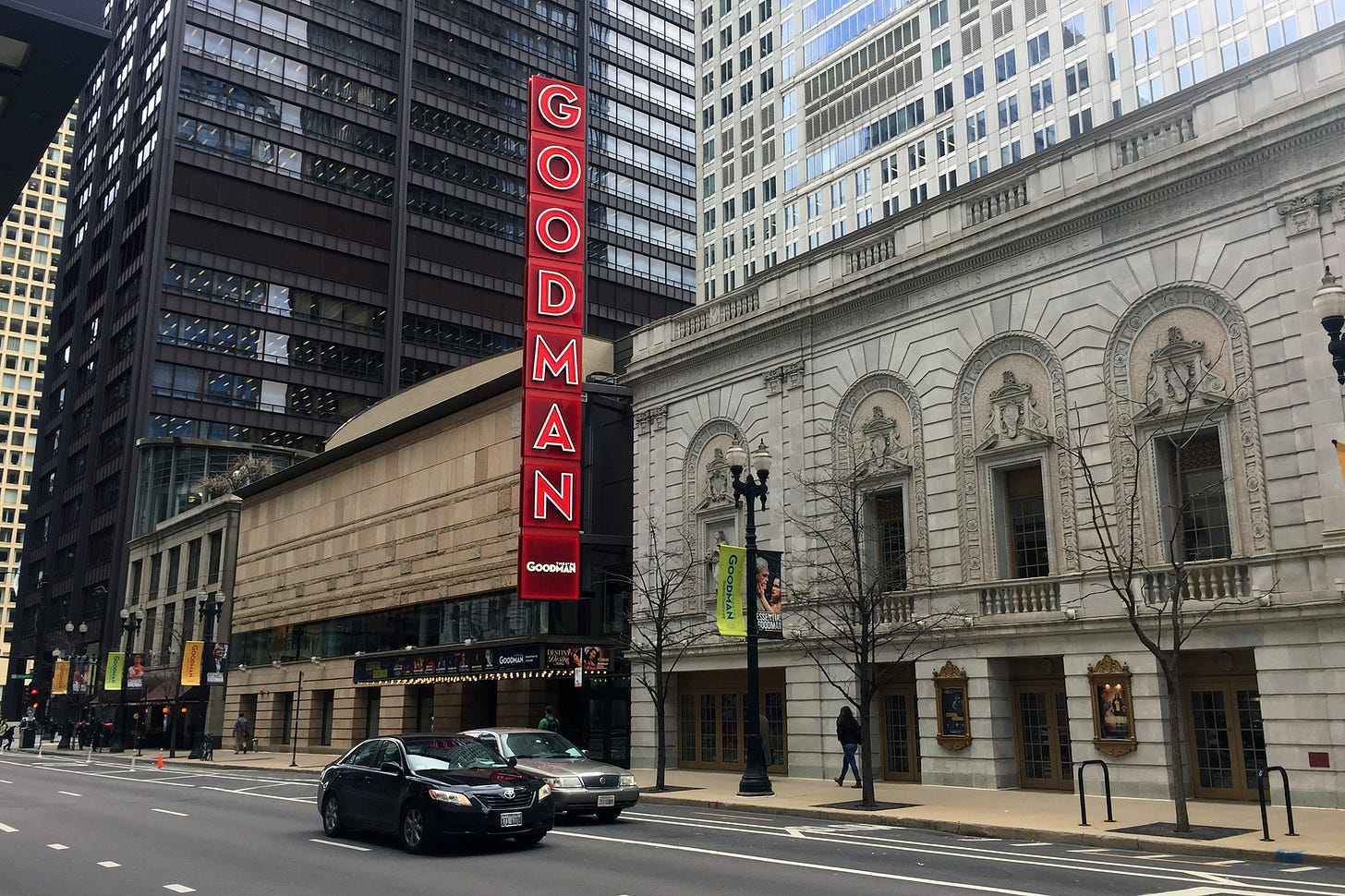Chicago’s history with the Pulitzer Prize for Drama
Plus rescheduling news from the Goodman and Broadway in Chicago
The Goodman Theatre is officially dark until the fall—at least.

In a not unexpected announcement today, the Goodman confirmed that it won’t be mounting the four shows in its 2019–2020 season that were yet to open as of the mid-March shutdown.
The bigger news, though, is that the Goodman is committing to producing all four—School Girls; Or, The African Mean Girls Play; Molly Sweeney; American Mariachi; and the highly anticipated new musical adaptation of The Outsiders—as part of its 2020–2021 season. (School Girls is also currently available to stream at home—read to the end of this post for details.)
The Goodman had yet to announce a full slate for 2020–21 when the COVID pandemic ground live events to a halt two months ago. Its only public commitment was to the world premiere of Doug Wright’s Good Night, Oscar, starring Sean Hayes, in January 2021.
That seems to have left the Goodman with more flexibility than, say, Steppenwolf, which had announced its 2020–21 season in early March, and has thus pushed this spring and summer’s canceled shows all the way back to 2021–2022.
The Goodman didn’t hint at dates for the rescheduled shows next season, saying that a complete lineup and details will be announced at a later date. These four productions plus Good Night, Oscar would account for more than half of the Goodman’s eight-show subscription season (which doesn’t include holiday offerings A Christmas Carol and The Santaland Diaries). It’s possible—likely, even—that the theater will offer a foreshortened season with a later start, depending on the pace of recovery from the pandemic and economic shutdown.
Also this week, Broadway in Chicago acknowledged its stages will be dark through most of the summer. The return engagement of Dear Evan Hansen, which was scheduled for a 12-week stay at the CIBC Theatre from July 7 to September 27, has been canceled, with hopes that it will return in 2022. The dedicated Chicago company of the musical SIX, scheduled to begin July 8 at the Broadway Playhouse, has been pushed back to November 24, while the touring engagement of Jesus Christ Superstar intended to play the Cadillac Palace August 11–23 has been rescheduled for September 2021. Come from Away, scheduled to return to the Cadillac Palace August 25–September 6, is still on the calendar for now.
Chicago and the Pulitzer Prize
The 2020 Pulitzer Prizes were announced last week, with the annual drama prize going to Michael R. Jackson’s meta-musical A Strange Loop, which premiered at New York’s Playwrights Horizons last summer. I haven’t seen it, but it’s pretty much universally praised by everyone I know who has. (The show was meant to have a second run at Washington, D.C.’s Woolly Mammoth Theatre this fall in what was understood to be a ramp up toward a Broadway transfer, but producers announced this afternoon that the Woolly run will be pushed back to next summer.)
This year’s two named finalists also played Off Broadway last year: Will Arbery’s play Heroes of the Fourth Turning, like A Strange Loop, premiered at Playwrights Horizons, while David Henry Hwang and Jeanine Tesori’s musical Soft Power played the Public Theater last fall after premiering at L.A.’s Center Theatre Group (it was a co-production and co-commission between the two theaters).
All three plays were widely acclaimed and, by all accounts, richly deserving. But the Pulitzer announcement, as it does most years, got me thinking about the award’s perception—deserved or not—as New York–centric. Only three times in the Pulitzer Prize for Drama’s 102-year history has the award gone to a work that hadn’t (yet) been performed in NYC: in 1992, for Robert Schenkkan’s The Kentucky Cycle; in 2003, for Nilo Cruz’s Anna in the Tropics; and in 2012, for Quiara Alegría Hudes’s Water by the Spoonful.
The process by which the drama prize is awarded isn’t exactly arcane, but it’s unique among the major playwriting awards in the country. At the beginning of each year, the Pulitzer administrators name a jury of experts—folks who have a finger on the pulse of dramatic writing and the breadth of new plays being produced across the country. For the first several decades, the jury consisted of three New York–based critics; in the mid-1980s, the jury was expanded to five members, and the Pulitzer board reportedly made an effort to include more critics from other parts of the country. In recent years, the jury has also included academics, as well as playwrights who’ve previously won the Pulitzer.
The jury names three (usually) scripts as finalists, and the Pulitzer board—made up largely of newspaper reporters, columnists, editors and publishers—chooses a winner. Or not: On 15 occasions, the board has chosen not to award the drama prize, and even more rarely the board has selected a work not recommended by the jury.
My colleague Peter Marks, the chief theater critic for the Washington Post, has chaired the drama jury four times in the last 13 years (though he didn’t serve this year), so I turned to him for a little more insight into the process. Each year the jury is expected to read every script that’s formally submitted, Marks told me; “in an average year, I’ve read 90 or so scripts,” he said.
“A healthy number premiere at regional and even local theaters,” he says of the submitted scripts. “A few in my experience are even produced in small towns and by theater companies I'd never heard of.” But the jury is also free to consider plays that haven’t been officially entered into the contest, and “I have gone to bat for plays I first saw outside of New York,” he adds.
Marks doesn’t see a particular New York bias among the Pulitzer board, whose current makeup includes members based in Florida, Texas, Massachusetts and Washington, D.C. as well as NYC. Still, he allows, “I think it's undeniable that having a [New York] production is useful, especially if board members can get to see the shows. The Pulitzer for drama remains a literary prize, but I wonder if the evolution of the field—the growth of theater that is not strictly text-based—makes that standard obsolete.”
While several plays that were first seen in Chicago have won the Pulitzer in the current century—Tracy Letts’s August: Osage County (2008), Lynn Nottage’s Ruined (2009), and Ayad Akhtar’s Disgraced (2013)—all had gone on to New York stagings within the same year as their Chicago stagings.
In addition to August: Osage County, Letts has the distinction of having two plays named as finalists without the benefit of a New York production: Man from Nebraska in 2004 and The Minutes in 2018. Several other plays that were first seen in Chicago across the last two decades have also been finalists, among them Adam Rapp’s Red Light Winter (2006), Kristoffer Diaz’s The Elaborate Entrance of Chad Deity (2010), Lisa D’Amour’s Detroit (2011), and Stephen Karam’s The Humans (2016).
Chicago has also been well represented on the drama juries, at least since 1995, when the Pulitzer board began identifying the jury members (only after the year’s award is announced). Longtime Tribune critic Richard Christiansen chaired the jury in 1995 and 1996 and served twice more, in 1998 and 2000, before his retirement. Michael Phillips served twice during his tenure as Christiansen’s successor, in 2004 and 2005, while the Trib’s current chief critic Chris Jones served in 2006 and 2011. Former Sun-Times critic Hedy Weiss was on the jury in 1999, 2001 and 2010. On the academic/practitioner side, Lisa Portes was a juror in 2008, and Henry Godinez served in 2019.
Streaming updates

Karen Janes Woditsch and Craig Spidle in To Master the Art. Photograph: Lara Goetsch
Another Chicago theater is reaching into the vault for archive video to offer viewers at home. TimeLine Theatre Company is now streaming a recorded version of To Master the Art, William Brown and Doug Frew’s biographical portrait of a young(ish) Julia Child in Paris. The play was first mounted by TimeLine, under Brown’s direction, in 2010, and later received a commercial remount at Broadway in Chicago’s Broadway Playhouse in 2013, where this video recording was captured. (You can read my 2013 review here.) Tickets ($15 or $25) are available for remote screenings now through June 7. To complete the experience, TimeLine has compiled a handy list of local French restaurants offering delivery or curbside pickup.
Victory Gardens Theater tells me it’s sold streaming tickets for Fun Home to viewers in 23 countries, and within the U.S. it’s reached 47 states plus D.C., Puerto Rico and Guam. Streams are sold out through this weekend, but you can still purchase access for May 20–24.
While School Girls will be back at the Goodman sometime next season, the theater’s streaming version (using video captured in previews the week of March 11, before the March 16 opening was canceled) has been a success. It’s now available through May 31, and Goodman says it’s upgraded its video platform to now allow viewing on your TV via Google Chromecast or Apple AirPlay.
Theater Wit has twice extended its streaming run of Teenage Dick, which like School Girls was captured in previews before the state’s stay-at-home order went into effect in March. It’s currently on sale through May 24.



